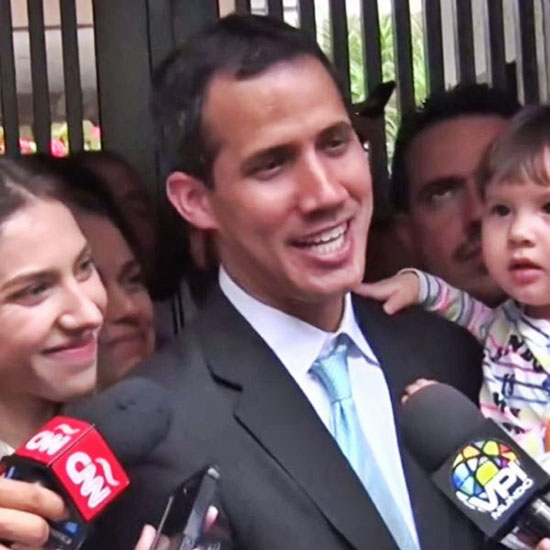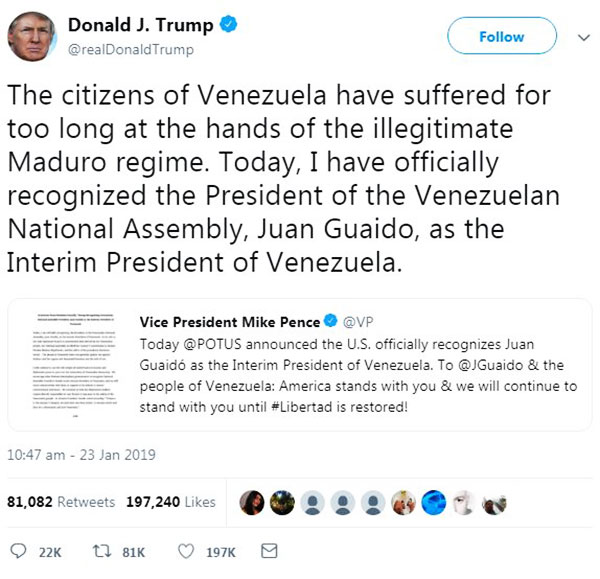|

by Robert Bridge
February 13,
2019
from
Strategic-Culture Website

© Photo: Public domain
A virtual unknown before declaring himself president of Venezuela,
it seems that Guaidó's only qualification for the job is a
willingness to open up his country's vast oil reserves - and much
more - to U.S. companies.
If it seems like we've been here before, that's not just déjà vu
talking to you.
Reminiscent of Ukraine's 2014 Maidan uprising, which saw U.S.
officials dictating the political makeup of the unelected opposition
government, something equally sinister is taking place in Venezuela
where Washington is working to topple the "Maduro regime" and
replace it with a puppet ruler.
The name of that puppet-in-waiting is
English-speaking, U.S.-educated, Obama doppelganger Juan Guaidó,
35, who in a very short period of time went from relative obscurity
- 80 percent of Venezuelans
reportedly never heard of him
just one month ago - to declaring himself the interim president
of the Latin American country.
How on earth does something like that happen?
In reality it doesn't, unless there are some very powerful forces
aligned behind the individual.
Guaidó was not even a
high-ranking member inside of his own party, Popular Will,
yet in early January was handpicked to be President of the National
Assembly, Venezuela's unicameral parliament.
This set the stage for
Guaidó to be positioned as some sort of legitimate usurper to
residing President Nicolás Maduro, whose victory at the polls
was declared "fraudulent" by the opposition, despite the fact that
Venezuela has one of the most
transparent election processes in the
world.
In other words, what we have here is a classic domestic political
dispute, much like what is
happening in France for the
thirteenth weekend in a row.
Yet that has not
prevented the United States from exerting extreme pressure on the
situation - not on Paris, of course, but on Caracas.
Which begs the
question:
-
Are the French people any less worthy of intrusive
American meddling in their domestic affairs than
Venezuelans?
-
Why the double
standard when it comes to
not sending humanitarian aid
packages to the taxed 'Yellow Vest' protesters?
-
And how is it
that the government of French leader Immanuel Macron can
arrest the leader of the "hateful mob," as he described
them, without any recriminations from the Western mainstream
media?
I shudder to think what
sort of hell will rain down on Venezuela should Guaidó suffer a
similar fate. But I digress.
Members of the most-righteous Republican Party, as well as
high-ranking officials inside of the Trump administration, have
taken an active role in energizing the Venezuela flare-up, goading
the opposition while prodding the military into rallying behind Juan
Guaidó.
https://twitter.com/marcorubio/status/1093960392378892290
In fact, on January 22, the day before a scheduled mass protest
against Maduro, Vice President Mike Pence, doing an
impressive Robocop impersonation like only he can, sent an
unblinking message to the protesters:
"Nicolas Maduro is a
dictator with no legitimate claim to power,"
he droned
metallically.
"He has never won the
presidency in a free and fair election, and has maintained his
grip of power by imprisoning anyone who dares to oppose him."
Is it any coincidence
that the very next day Guaidó - with the ironclad blessing of the
United States - unilaterally declared himself interim president
of Venezuela?
But the meddling from Uncle Sam has gone beyond the merely
rhetorical.
Less than a week after
Guaidó assumed his whimsical throne, the Trump administration went
after the jugular of the real government, sanctioning the
state-owned oil company PDVSA with the proviso that the sanction
regime will be lifted once Caracas transfers control of the company
to the opposition.
A less diplomatic way of
describing that arrangement would be 'blackmail'...
Incidentally, there's a rather hefty footnote to the Venezuela
crisis that the media has not been talking about.
In 2017, Goldman
Sachs bought about $2.8 billion (at 31 cents on the dollar, or
about $865 million) for bonds issued by Petróleos de Venezuela
SA in 2014, the Wall Street Journal
reported.
"Those bonds
double in value if Maduro goes," Jan Dehn, head of research
at the Ashmore Group
told Forbes.
Is it any wonder, then,
that Trump the consummate capitalist has called up from the bullpen
some of the most notorious names in the business to deal with Maduro?
Nice guys like
Eliot Abrams, who makes John
Bolton resemble a Boy Scout by comparison...
According to Secretary of
State Mike Pompeo, Abrams, who was once tasked with
covering
up the
El Mozote massacre at the hands
of U.S.-trained Salvadoran troops, will oversee Venezuela's
"democratic transition."

This sends an unmistakable message to the Venezuelan government, and
certainly not one that Hallmark would have in stock.
As Jon Schwarz
wrote in The Intercept,
"it's uncanny to see
how Abrams has almost always been there when U.S. actions were
at their most sordid."
But that's just the icing
on the crap cake.
The White House has
already assembled a squad of 'shock doctrinaires' to deal with the
Socialist patient once it's prostrate on the operating table.
Harvard professor Ricardo Hausmann, for example, who once
served as Venezuelan economic minister is now Guaidó's on-call
adviser.
In a sign of the pain to come should the Georgetown University
graduate gain control, Hausmann, who admitted to having discussed
the plight of Venezuela with the IMF, was
quoted by Bloomberg as
saying,
"This is a country in
a terrible situation; the haircut has to be large."
We've seen such
strong-handed tactics before by the Trump administration in places
like North Korea where a lot of heated rhetoric eventually simmered
down into negotiations and, to everyone's surprise, some semblance
of peace.
Trump is a businessman,
after all, and he makes a point of prompting talks with a lot of
swagger and bluster in an effort to throw the other side off
balance. It's a risky game in an age of nuclear weapons, but thus
far it has worked.
Nevertheless, with all of the notable hawks in the Trump
administration squawking aggressively, it looks as though another
U.S. military intervention were on the horizon. However, and this is
a serious factor, the Venezuelan people are still behind Maduro, and
the threat of a U.S. invasion - real or imagined - has had the
effect of galvanizing that support.
A full
86 percent of the
people have no desire to see the Libyan business model imposed upon
them.
Meanwhile, Juan Guaidó proved his political ineptitude and overall
gullibility when he commented this week that he,
"may 'authorize' a
U.S. military intervention."
That's a very poor
reading as to how the world - at least the world according to
America - has been working.
These days not even U.S.
Congress is empowered to authorize such things, since most
presidents (before Trump, who, to his credit, has kept the U.S. out
of military smashups) act unilaterally when it comes to mandating
military aggression.
Moreover, Guaidó will
simply have no say over such matters, of course, if push comes to
shove.
The fact that the young political upstart seems to think otherwise
suggests the White House may have stumbled upon the perfect tool in
its regime change toolkit, which hasn't been opened in several
years.
Hopefully, Trump won't be
tempted to reopen it any time soon.
|



